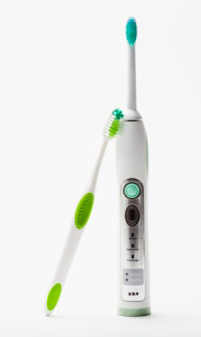 The verdict is in: electric toothbrushes are here to stay, and they mean business for your teeth! By now, you’ve probably seen them on the shelves, on TV or in magazines. Dentists endorse them, and most are ADA-approved — but if you still swear by your manual toothbrush, these benefits just might convince you otherwise.
The verdict is in: electric toothbrushes are here to stay, and they mean business for your teeth! By now, you’ve probably seen them on the shelves, on TV or in magazines. Dentists endorse them, and most are ADA-approved — but if you still swear by your manual toothbrush, these benefits just might convince you otherwise.
The Pros Of Using An Electric Toothbrush
Making the switch from a manual to an electric toothbrush doesn’t change the amount of time it takes to thoroughly brush your teeth (approximately 2 minutes), nor should it alter your brushing technique, but this is where the similarities end. Some of the biggest advantages of electric toothbrushes over traditional toothbrushes are:
1. Effortless brushing.
Because a motor oscillates and rotates the bristles for you, it requires less energy to brush your teeth. Many even find the rounded handle of electric toothbrushes to be easier to hold, and with less force required, brushing can still be done thoroughly without using a tight grip. For the elderly, those with chronic arthritis, and children and adults with dexterity challenges, this alone can make electric toothbrushes the better choice for oral health maintenance.
2. Better cleaning ability.
Thoughtful bristle design coupled with the automatic power of electric toothbrushes makes it easy to remove plaque from hard to reach areas. The constant rotating and even pressure can also result in a more consistent cleaning than you might achieve with a standard toothbrush. Often, electric toothbrushes come with a variety of heads that you can experiment with until you find one that cleans your teeth the best.
3. Other hygiene-helping features.
Thanks to technology, electric toothbrushes come with many other bells and whistles that can help ensure proper hygiene. From timers that notify you once you’ve brushed long enough, to sensors that alert you if too much pressure is being applied or if the head needs to be replaced, electric toothbrushes can help you stay on track to meet multiple oral health goals.
4. Less plastic to be thrown away.
Unlike manual toothbrushes, you don’t need to toss out the whole brush once the bristles are worn. Only the head of an electric toothbrush needs to be replaced, which means a lot less plastic that is thrown out in the long run. From an environmental standpoint, electric toothbrushes are also a better choice than battery-operated toothbrushes because they can be recharged.
Other Factors To Consider
Just as there are pros to using an electric toothbrush, there are a few cons to be aware of before making a final decision.
- Price: Electric toothbrushes are significantly more expensive than manual toothbrushes; the price difference may cause some initial sticker shock. However, to keep costs down you can always purchase one electronic toothbrush and multiple detachable heads – for each member of the household.
- Convenience: Those who are frequently on the go may find it slightly cumbersome to have to pack a charger.
If you’re interested in an electric toothbrush, however, don’t cross it off your list without trying a battery-operated toothbrush first. It’s similar in concept and feel, but much more affordable, and it can help you determine whether electric toothbrushes are worth the investment.
Comfort Matters Most
A toothbrush loaded with features won’t do you any good unless you’re comfortable with it. For the sake of your oral health, it’s worth considering all the toothbrush options available, but choose the one you believe will best help you maintain good hygiene…whether it be manual or powered. If you’re still unsure and need additional guidance, ask your dentist for help; he or she may recommend a particular brand based on your unique dental needs.


News